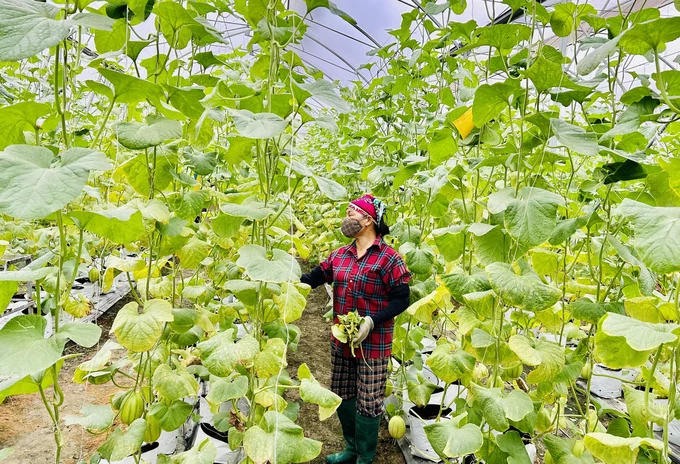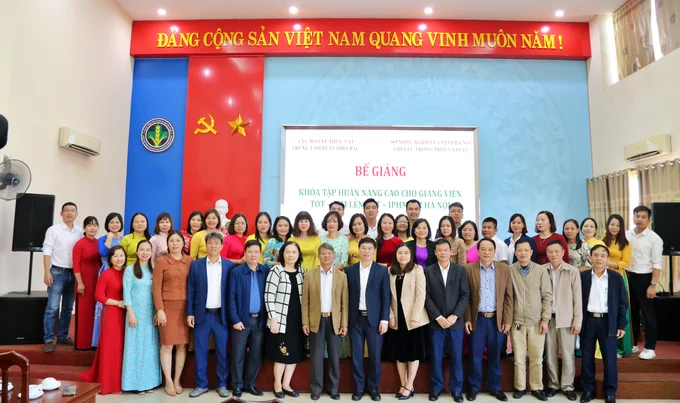June 14, 2025 | 14:12 GMT +7
June 14, 2025 | 14:12 GMT +7
Hotline: 0913.378.918
June 14, 2025 | 14:12 GMT +7
Hotline: 0913.378.918

IPHM is an important foundation for Hanoi to implement the process of restructuring high-quality crops, organic agriculture, ecology, and biodiversity. Photo: Phuong Thao.
Sharing at the Closing Ceremony of the Advanced Training Course for TOT-IPM lecturers to become TOT-IPHM Hanoi organized by the Plant Protection Department and Hanoi Department of Agriculture and Rural Development last weekend, Ms Luu Thi Hang, Director of Hanoi City Department of Crop Production and Plant Protection emphasized that the training course improves from IPM (Integrated Pest Management) to IPHM (Integrated Plant Health Management) is important in meeting practical needs and cultivating knowledge for technical staff.
Hanoi agriculture is in the process of transforming the structure of high-quality crops, organic agriculture, ecology, and biodiversity. To meet this requirement, on the IPM platform, Hanoi has deployed 23 teacher training classes with classes on vegetables, fruits, rice, flowers... and over 1,400 classes for farmers. Every year, the City check and evaluate the quality of over 1,000 vegetable samples, of which only 1 - 2% of samples exceed the allowable threshold, and the remaining 98 - 99% of samples meet the quality within the safety threshold.
"Currently, Hanoi's farming areas are applying the techniques of the "3 decreases, 3 increases" program to manage pests. As a result, seeds are saved by 50%, fertilizers are reduced by 40-50%, pesticides are reduced by 70%", Ms Hang informed.
Models developed by the City Department of Crop Production and Plant Protection. Hanoi directly appoints an area of 50 ha to have 100% of crops grown without the use of pesticides. Localities that have maintained these models so far do not have to use pesticides. In 2023, the Branch will organize 27 IPHM application classes to continue to develop and expand the application of this knowledge for farmers.
Leader of the Hanoi City Department of Crop Production and Plant Protection expects that, after the course, students returning to the localities will impart knowledge to help farmers apply IPHM in production, and farming, creating major changes in the city's farming industry.

Vietnam currently has 486 national and provincial lecturers with TOT-IPHM certificates. Photo: Phuong Thao.
Mr. Nguyen Quy Duong, the Deputy Director of the Plant Protection Department, said that with the strategy of the Ministry of Agriculture and Rural Development, IPHM will deploy many long-term and short-term training classes for farmers. Based on the knowledge acquired in the course, Mr Duong hopes that students participating in the program will conduct research, advise and apply it to major local crops and build proof models.
According to Mr. Duong, animal health and crop health are the ways to ensure nutrition for humans. This is a new approach. In the design program, the Plant Protection Department, with the support of FAO, has proposed three important cores for implementation: training program, documents, and TOT instructors.
Vietnam is the first country to deploy IPHM in ASEAN. By the end of this training course, Vietnam had 486 national trainers and provincial trainers. They are the first generation to be certified with TOT-IPHM.
With 12 years of working in the plant protection industry, student Le Thi Kim Tuyet, Ha Dong Crop Production and Plant Protection Station (Hanoi) shared that she received a lot of new knowledge and practical experience from lecturers on plant health.
“Previously, I was trained in IPM, but after this course, I realized that there needs to be a more comprehensive focus on plant health through IPHM. After the training, I will return to share new knowledge with farmers and change their thinking in applying the measures of the IPHM course", Ms Tuyet confided.
According to Ms Tuyet, the greatest value received from this training course is understanding about the goals of the agricultural sector in demand for production, providing the market with safe products, and ensuring nutrition and health for everyone.
The advanced training course for TOT - IPM trainers to become TOT - IMHM in Hanoi has 30 students in 3 provinces/cities: Hanoi, Bac Kan, and Bac Giang. At the end of the course, 100% of students achieved perfect results, of which 30% of students achieved excellent grades, and 70% of students achieved good or excellent grades.
Translated by Hoang Duy

(VAN) In Tien Giang, a high-tech shrimp farm has developed a distinctive energy-saving farming model that has yielded promising results.
![Turning wind and rain into action: [3] 300.000 farmers benefit from agro-climatic bulletins](https://t.ex-cdn.com/nongnghiepmoitruong.vn/608w/files/news/2025/06/12/e5a48259d6a262fc3bb3-nongnghiep-125122.jpg)
(VAN) The agro-climatic bulletin has become a valuable tool for farmers in the Mekong Delta. After more than five years of implementation, the initiative is gradually being expanded nationwide.
![Turning wind and rain into action: [2] Providing forecasts to the people](https://t.ex-cdn.com/nongnghiepmoitruong.vn/608w/files/news/2025/06/12/e5a48259d6a262fc3bb3-nongnghiep-103927.jpg)
(VAN) In addition to improving the quality of hydrometeorological forecasts, putting forecast bulletins into practical use is crucial for production and disaster prevention.

(VAN) Blue carbon is receiving attention for its rapid absorption capacity and vast potential. It represents a promising nature-based solution to respond to climate change.
/2025/06/11/3507-1-161904_583.jpg)
(VAN) Seagrass beds and coral reefs serve as 'cradles' that nurture life in the ocean depths, creating rich aquatic resources in Vietnamese waters.
![Turning wind and rain into action: [1] Forecasting for farmers](https://t.ex-cdn.com/nongnghiepmoitruong.vn/608w/files/news/2025/06/11/e5a48259d6a262fc3bb3-nongnghiep-111919.jpg)
(VAN) Weather is no longer just a matter of fate. Forecasts have now become an essential companion for farmers in every crop season.
/2025/06/10/2501-3-082025_983.jpg)
(VAN) Mr. Le Hoang Minh, Head of Vinamilk's Net Zero project, recently shared insights on the integration of production, energy, and technology in Vinamilk’s green transition journey.